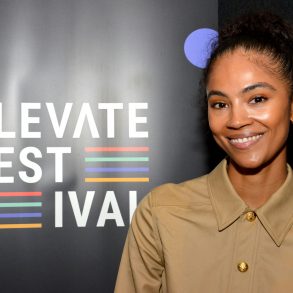When Tom Patterson laid the foundation for the Stratford Festival in 1953, he simply saw the connection to the Bard and an opportunity to revitalize the town. While the festival continues to do just that, it has gone beyond the works of the Bard to open its stages to great works by folks all around the world, becoming a home to everything from iconic dramatic plays to make-you-tap-dance musicals. The 2017 Stratford Festival provides great insight into the breath and diversity of its programming.
Its super exciting to dive into the world of Stratford with a conversation with Mikaela Davies, a Montreal-born artist who we’ve been hoping to chat with for a long time. Davies is no stranger to theatre. In fact, you’d mistaken her as probably owning one with the number of projects she’s got going on. From the 2017 Director Development Residency at the Canadian Stage, to juggling three different productions at Stratford, to a number of other projects in the pipeline, she quite actively lives the “living and breathing” part of the statement “living and breathing theatre.”
She takes a moment from her busy schedule to give us an inside look at getting involved with the Stratford Festival, tackling unique characters like Beatrice-Joanna in The Changeling, and playing the balancing act of life while going on this amazing theatre adventure.
Grab a coffee or a wine, cozy up, and read our wonderful interview below. Some great insights from a truly hardworking Canadian artist.
[divider]Happy Reading![/divider]

It is very exciting to see you tackle the Stratford Festival this summer. How does it feel to be a part of an organization -and a festival of significant cultural importance- as both an actress and a Canadian-especially, and this being Canada’s 150th?
It feels amazing. I have been coming to see shows at Stratford since I went to F.A.C.E. high school and all the way through The Dome theatre school in Montreal. There’s this photo of me 13 years ago with dyed blonde hair standing outside the Festival Theatre with my friends that I recently found. There’s something really special to now be part of an institution that played such a big role in my theatrical education growing up. I’ve recently had the chance to meet students in talkbacks who are here with their schools, it’s been neat to have that come full circle.
As Stratford is a classical theatre company, many of the plays done are by deceased European male playwrights but there is something unique happening here for Canada’s 150th. The specially commissioned The Breathing Hole by Canadian playwright Colleen Murphy is premiering at The Studio Theatre this year, directed by Reneltta Arluk featuring an Indigenous cast. In addition, Canadian playwright Kate Hennig has her premiere of The Virgin Trial, and Sharon Pollock’s The Komagata Maru Incident will also be seen at The Studio Theatre. As an actor and director, I was especially proud to see that eight of the fourteen productions this season are being directed by women, with more and more diverse casts. I commend Stratford on finding a marriage between classical text and current Canadian voices.

Congratulations for your role as Beatrice-Joanna in The Changeling! Tell us a little about the journey getting to the point of stepping into Beatrice-Joanna’s shoes. How familiar were you about the story and the character prior to Stratford? Did you revisit notes or recollect past productions when developing your character for the Stratford stage?
Thank you! I’m still very much on that journey. I hadn’t come across the play until it was announced as part of the 2017 season, so I was coming at this role entirely blind. I did do some research on past productions to try and get a feel for what kind of companies were presenting this piece, how the story was perceived, where it’s place was in society…I ended up going down a rabbit hole of terrible critical assessment’s of Beatrice-Joanna’s character. Jackie Maxwell, our director, talks about some of this criticism in her program notes: “Beatrice-Joanna has been called everything from a hapless sex kitten to a demonic madwoman”. I found it interesting to examine how we view a woman who undertakes violent measures to get what she wants compared to how we view men who undertake violent measures to get what they want, such as Macbeth, Richard the Third and Hamlet.
The research was a fun starting point, but figuring out who this woman was really came from being in the room under Jackie Maxwell’s direction, along with Ben Carlson who plays Deflores and Cyrus Lane who plays Alsemero. I have to say that I got incredibly lucky with this trio. Jackie created an open environment in rehearsals where I felt empowered to have a voice in the room – this is always a wonderful thing for a director to create but especially so when we are telling stories that deal with the rights of women in the 1600’s. Ben and Cyrus are not only terrific actors who have been great partners in crime, but they are both extremely funny. I have built new levels of concentration through trying not to laugh on stage!
As I had never seen another production, and it’s not a play that’s done too often compared to Shakespeare’s works, there was a kind of freedom in that. I didn’t feel like I needed to live up to anybody’s vision of the part but my own. I spent quite a bit of time working with coaches, breaking down the language of the text, my goal (and it’s still ongoing) to make every word, every thought, and every argument my own with the urgency and necessity I would have in her given circumstances. I suppose that’s always the goal but easier said than done with text like this:
So, here’s one step
Into my father’s favour; time will fix him.
I have got him now the liberty of the house;
So wisdom by degrees works out her freedom.
And if that eye be darken’d that offends me
(I wait but that eclipse), this gentleman
Shall soon shine glorious in my father’s liking
Through the refulgent virtue of my love.

The revenge tragedy genre really came about in the Jacobean-era of theatre, but started as early as the Elizabethan-era – the prime era of Shakespeare. While most people think of Stratford as a venue to experience Shakespeare (and it is, for the most part), The Changeling is a very different experience. What can audiences expect from the production?
It’s quite psychologically complex. It’s gory. It’s violent. It’s sexy. In Middleton, the thoughts and points shift so quickly. In Shakespeare, you’ll often spend a few lines to illustrate a single argument, with each line being a furthering of that point. In Middleton, I’ve found the arguments and points shift sentence to sentence. My character in particular thinks so fast without any thought to possible consequences. She operates in tunnel vision. Jackie has directed the production to move along at quite a speed, as she jokingly stated many times, because if anyone stops to think they’ll realize what a terrible idea their plan is!
For many audience members, they can expect a story that they might not already know. In Shakespeare, the average theatre goer often has a basic understanding of the story. We go to see certain actors take on a particular part, or watch a director’s interpretation. We look to the how it’s going to happen but not to the what. For anyone who hasn’t previously seen The Changeling (and it’s not done very often), I believe there will be a real suspense in what’s going to happen next. There’s something exciting about doing a classical text and hearing your audiences debate over intermission “Is that person going to die?”, “Are those two going to end up together?”, “Will that person find out?”. To be playing with actual mystery and feel the audience living in that mystery is a different experience for me. A colleague of mine described the play as Game of Thrones for classical theatre. There’s blood, sex, murder, desire – it’s exciting, it’s dark.

One would find it difficult to wrap their head around the fact that they have to present one character many times over the span of multiple weeks (4 months in the case of your Beatrice-Joanna!). You have taken on another two characters in two other plays at Stratford. First off, Kudos! Second off, how do mentally manage these characters, especially considering two of the productions are happening at the same time?
Working in repertory takes some mental gymnastics. In Timon of Athens, I play a number of small supporting characters, so Timon is my down time. I get to serve these little roles in the story, and be a part of the paint in a much bigger picture. It’s been a real treat to be in the room with Joe Ziegler –who is one of my favourite stage actors– under the sharp direction of Stephen Ouimette, and watch them work.
We are just getting into the swing of rehearsals for The Madwoman of Chaillot, being directed by Donna Feore and with Seana McKenna in the title role (a powerhouse team). I’m playing a character called Irma the Kitchen Girl. Madwoman is a very different play from The Changeling. It’s a lot lighter, it’s a comedy, the character I’m playing is considerably more innocent and open hearted and well, you know, she doesn’t hire anyone to murder her fiancé. She works in the kitchen of a cafe in Paris and falls in love with a young man, Pierre, being played by Antoine Yared. In this cafe she spends a lot of time with her friend, Florette the Deaf Signer, played by Elizabeth Morris. Irma is the only one who understands Florette so for the role I have been learning some American sign language. This has been absolutely fascinating. Liz in real life is deaf and has been opening our eyes to deaf culture and history. ASL is such an expressive beautiful language. I find it lends itself to theatre really well. Liz is an expert at reading lips but there are many times when a character at any given moment will have their back to Liz because we are working in the round. We’ve discovered that I will be summarizing and translating into ASL what characters are saying fairly often. This seems so obvious to me now but a couple months ago I wouldn’t have thought about it. An education like this is an extraordinary experience.
When I came to see a show in Stratford years ago a student asked an actor in a talkback, “How do you manage all these different parts?” She replied, “They’re like different subjects in class, you wouldn’t take your math homework to your gym class, it’s an entirely different subject.” There’s a lot of truth in that, the worlds are so different. Timon of Athens, written in the 1600’s, is set in 2017; The Changeling, written in the 1600’s, is set in 1930’s Spain; and The Madwoman of Chaillot, written in 1943, is translated this year by David Edney and is set in 1940’s France. Everyone looks and sounds completely different in these three shows. It will be a nice balance for me to go from the darkness of The Changeling into the lighter world of The Madwoman of Chaillot. I’m grateful for it.
 Your commitment to theatre is pretty incredible. You’ve been an active artist with Soulpepper Theatre, selected to be a 2017 Director Development Residency participant at Canadian Stage (congratulations) and now a part of Stratford Festival 2017. What drives your passion for theatre?
Your commitment to theatre is pretty incredible. You’ve been an active artist with Soulpepper Theatre, selected to be a 2017 Director Development Residency participant at Canadian Stage (congratulations) and now a part of Stratford Festival 2017. What drives your passion for theatre?
I was working on a grant recently and had to talk about my artistic drive, which is something I’ve always found difficult to put into words but I found this quote by philosopher and poet John O’Donohue:
“Friendship is always an act of recognition – in the moment of friendship, two souls suddenly recognize each other. It could be at a meeting on the street, or at a party or a lecture, or just a simple, banal introduction, then suddenly there is the flash of recognition and the embers of kinship grow. There is an awakening between you, a sense of ancient knowing.”
I stumbled on this quote and I just thought: fuck yes. This is exactly what makes me interested in theatre; moments of recognition. To be a witness to a live story unfolding before my eyes and to have this moment of “oh man that’s me”, or that’s my mother, or that’s my father, or that’s what happened to my best friend is a powerful thing because, let’s face it, life is really confusing and tricky, and relationships in life are confusing and tricky. We love, we hurt, we envy, we desire. Sometimes I wander around feeling completely confused and neurotic, and to see that I’m not alone, to feel that I’m not alone, is one of the most life-affirming things I can receive. To be part of something that strives for that, I think, is a worthwhile profession.

You have had many hats on when it comes to theatre, jumping between the lines of performer and director. Your stint at Canadian Stage with the Development Residency program hints at many things. What area of theatre do you wish to ground yourself more in, or is focusing on direction really to expand your skill set?
I directed my first production of a play at the age of 21. I started directing for two reasons. When I was in theatre school, I would often be asked to coach my friends on their scenes. It was something I enjoyed to do and I found I had a knack for it, so that became a skill set I developed. On the other hand, on a super practical level, I started directing because I wasn’t getting work as an actor. As soon as I realized no one was going to hand me any opportunities, I started to hustle and create my work. I started producing, I started directing, and even started writing a bit. It was just a practical way for me to be involved in storytelling. And I failed hard. I did a lot of terrible work and that was an important part of my development. Now directing has become a part of who I am as an artist.
I know that if I wasn’t also acting, I would be deeply unsatisfied. Anytime an opportunity has come up to take me out of the acting scene, and solely concentrate on directing, I’ve let it go by. But I love it, I deeply love it. I’ve become more passionate about politics in my work and as a director, I am put in a position of power to contribute to that more than I feel I can as an actor. I believe in the power of storytelling and how the types of stories we tell inform how we view people in the world. As a director I can (sometimes) pick what plays I want to do, I can give more roles to women, more roles to diverse actors, and more roles to women of an older generation who are so often silenced in our narratives. It aligns not only with an artistic desire, but it’s a way to contribute to what’s important to me politically.

Asking what you are up to next is kind of a stupid question, but knowing you, anything and everything is possible! So…what are you up to, beyond Stratford and Canadian Stage, that people can see you involved in?
I’m directing our third remount of a play written by Polly Phokeev, How We Are, in Kingston this summer, with two fantastic actors, Sochi Fried and Virgilia Griffith. I’ll be acting in and directing a couple of workshops in the fall, and I should be directing another production for The Secret Shakespeare series. I’d love to do some film and TV. I’m not sure what the next big thing is yet.







